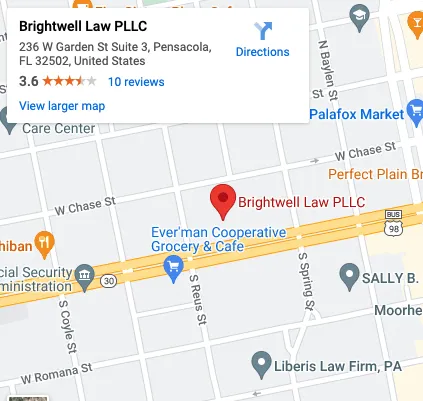A trust is a great estate planning tool if you want your assets to be protected legally after death. It ensures the proper distribution of assets (real estate, for example), saves time, avoids needless paperwork, and can potentially cut estate taxes. Regarding estate planning, a trust is one of the most important tools at your disposal. If you’re just starting to research into trusts for your estate and are unsure which one is the best for you, speaking with a Cantonment trusts attorney is the best way to start.
At Brightwell Law PLLC, our estate planning attorney can help you with your estate plans, whether they are complicated trusts or basic wills. Our knowledge and experience in Florida estate planning have enabled us to foresee and head off any issues and carry out our clients’ last wishes.
We also help clients in probate and estate administration, help settle any conflicts, and ensure that our client’s interests are protected. If you haven’t yet started the estate planning process, call Brightwell Law PLLC immediately!
Why do I need a Cantonment Trusts Attorney in Florida?
Working with a professional to plan your estate can be beneficial. This is especially true in the case of living trusts. Some benefits of working with a Cantonment trusts attorney are:
1. Estate planning is not one-size-fits-all. Our Florida attorney can counsel and guide you in the right direction, whether you require a trust, a power of attorney, a living will, or a combination of these.
2. Creating trusts is more complicated than wills. A wills&trusts law firm can help you create a trust, fund it, and reduce your tax burden. Even little errors can void your estate plan, so you may want help.
3. When creating a will, you must appoint someone as a trustee to manage the trust’s money. A Florida estate planning attorney can help you choose this trustee. A Cantonment trust attorney will explain a trustee’s obligations, suggest candidates, and serve as a trustee on your behalf in certain cases.
4. A strategic legal ally is needed when there are many questions you will need to consider when evaluating your estate planning needs, such as:
- Should you create an irrevocable living trust or a revocable living trust?
- Is it wise to set up a financial power of attorney?
- Should you appoint a power-of-attorney for healthcare?
5. A living trust and will attorneys can update your estate plan. Never “set it and forget it” in estate planning. Most experts recommend revisiting your approach annually and after major life changes.
What is a Florida Trust?
 A trust consists of four elements:
A trust consists of four elements:
- Trustee. All trusts need a trustee. A trustee is designated by the settlor (creator of the trust) with the legal power to handle and manage the trust property. One or more co-trustees may manage a trust. The trustee(s) are appointed during
- Trust Property. Refers to assets held by a trustor and trustee for a beneficiary. Cash, securities, real estate, and life insurance policies can be trust assets. Trust property is often referred to as “trust assets” or “trust corpus.”
- Beneficiaries. The people for whom trusts are created are known as trust beneficiaries.
- Guidelines and instructions. Documentation that establishes a trust and specifies how the trust will be handled. This is executed by the trust’s grantor. This trust instrument is also known as a trust agreement, a declaration of trust, or an indenture of trust.
A trust can hold any type of property, including cash, business entity ownership shares, personal property or real estate, and so on.
Moving assets to a Florida trust is a legal process that necessitates titled assets to be converted from individual to trust ownership. This is known as “funding the trust” and is an important aspect of the process.
What are the Benefits of Establishing a Florida Trust?
There are many reasons why a Florida trust should be considered in estate planning. Some common advantages are
- Bypass Probate: Assets left to beneficiaries often go through probate, which is an arduous and costly legal process. Avoiding probate may save your beneficiaries money and time while protecting your family’s privacy.
- Children as Beneficiaries: Your children can be named beneficiaries of your life insurance policy using a trust.
- Control of Assets: You have control over who gets your assets when you die by setting the terms of your trust.
- Private: Since trusts do not always become public records, they can benefit in protecting your privacy.
- Protection of Assets from Creditors: Like the tax benefit, moving assets from an estate can make it harder for creditors to get their hands on them and protect them from judgments against you.
- Tax Benefits: Some types of trusts allow assets to be transferred out of the estate, which could effectively lower estate and gift taxes.
Testamentary Trust vs. Living Trust
To better understand the various types of trust, it is helpful to compare the four main types: testamentary trust vs. living trust and irrevocable trust vs. revocable trust.
You, as the trustor, create all trusts, which may either be testamentary trusts or living trusts. As their names imply, these two basic types are:
- Living Trust: Also known as an inter vivos trust, it is created when you’re still alive. The efficient distribution of assets to beneficiaries is a common goal of a living trust. A living trust does this by avoiding probate, the court process for distributing assets after death. When you avoid probate, you save money and time in court, as well as potentially lower estate taxes for beneficiaries. Avoiding probate can save time and money in court, as well as potentially lower estate taxes for beneficiaries.
- Testamentary Trust: This kind of trust is established after your death in accordance with your final will & testament. Because the provisions of a testamentary trust are set in your will and may be altered at any point up to your death, a trust can be more flexible and simpler than a living trust.
Irrevocable vs. Revocable Trust
Trusts can either be irrevocable or revocable. The fundamentals and key distinctions between irrevocable and revocable trusts are:
- Revocable Trust: Since this is established when the grantor’s still alive, a revocable trust is considered a living trust. Its name alludes to the fact that the trust’s conditions may change during the grantor’s lifetime. Avoiding probate when transferring assets after death is the primary goal of a revocable trust.
- Irrevocable Trust: Unlike a revocable trust, the provisions of an irrevocable trust cannot be changed once it is created. The major motivation for establishing an irrevocable trust is to move assets out of the trust maker’s taxable estate. Income from the assets is no longer taxable to the donor during their lifetime, and the assets are no longer taxable to the donor’s estate following their death.
The Different Types of Trusts
Trusts can be broken down into four main categories: living, testamentary, irrevocable, and revocable. There are, however, more subcategories with various terms and potential benefits.
These are some types of trusts widely used in estate planning. Remember that several other types of trusts and special arrangements may be appropriate for your needs but are not included here.
Charitable Trusts
This type of trust is irrevocable and is created to help you, the beneficiaries, as well as a charity that meets IRS requirements. Charitable trusts are classified into two types: charitable lead trusts (CLTs) and charitable remainder trusts (CRTs) (CRTs).
Charitable Lead Trust
This trust, also known as a charitable lead annuity trust (CLAT), is established to offer financial assistance to charity or charities that have been chosen for a fixed length of time via an annuity. The remaining assets are eventually distributed among the beneficiaries.
Charitable Remainder Trust
This trust, also known as a charitable remainder annuity trust (CRAT), functions in the opposite manner as a CLT. A CRAT can provide you and your beneficiaries with an annuity for a predetermined time, with the remaining assets going to charity.
Grantor Retained Annuity Trust (GRAT)
This is an irrevocable trust established for a specific time to reduce taxes on significant financial gifts made to a loved one or other beneficiaries. When the trust is created, the trustor pays the taxes on the assets and gets an annual annuity payment for the duration of the GRAT. When the specified time expires, the remaining assets are distributed to the beneficiaries.
Irrevocable Life Insurance Trust (ILIT)
Although life insurance funds typically bypass probate, a life insurance payout may be included in an estate for tax purposes for some wealthy people. An ILIT can be used to keep life insurance funds out of the taxable estate and transfer the death benefit to beneficiaries immediately.
Spendthrift Trust
This trust protects inherited assets from the beneficiary’s potential financial irresponsibility. The beneficiary and its creditors don’t have direct access or control over the trust assets since they are owned by the trust. The trustee has the authority to determine how to distribute the trust assets. For instance, the trustee can specify a cash amount every year or specify how the funds are used.
Special Needs Trust
A special needs trust allows the trustee to decide and control how the trust’s assets are utilized for a beneficiary, just like a spendthrift trust. These trusts are often used for dependents with special needs, for example, a handicapped child, parent, or sibling who is unable to pay for his or her own financial needs.
Connect with Cantonment Trusts Attorney
A trust has the potential to be a beneficial estate planning instrument. But on the other hand, trusts are difficult to set up, and their use is not always recommended. It is important to seek legal advice with a Florida estate planning attorney, discuss the various benefits of trusts, and evaluate whether a trust is appropriate for you and your estate planning requirements.
At Brightwell Law PLLC, we want to ensure that everything is restored to its rightful owners. Our commitment to our customers is that they will get what they are entitled to.
As a law firm that deals with family law, probate law, or estate planning matters, we aim to take the unpleasantness out of these concerns. The resolution of your legal issues according to Florida statutes is our top priority.
Our attorneys will provide legal experience to help meet your needs and desires in estate planning, family law, or probate services. We currently serve Cantonment and surrounding areas in Florida. Contact Brightwell Law PLLC now, and we will gladly help you with your needs!


